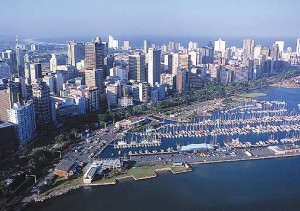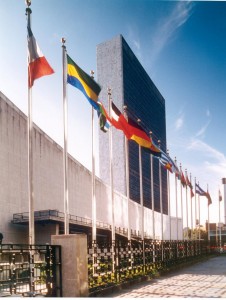Dickinson to Durban » Climate Change, Environmental Politics » Durban’s Challenge
Durban’s Challenge
By Timothy Damon ’12
With a population of more than 3.5 million people and an area of more than 2,300 km2, Durban is one of the most significant urban and economic centers in South Africa. A port city, it is on the front lines of climate change – at risk from storm surge and sea-level rise in addition to heat waves and air pollution. The local government has initiated some steps to address these hazards, but the widespread poverty and economic inequity of the area have thus far pushed the environment to a lower priority than development.
As Debra Roberts describes in “Thinking globally, acting locally”, the post-apartheid government’s policy shift to emphasize poverty eradication has resulted in great tension “between the need to introduce environmental issues and concerns into planning and decision-making processes (often for the first time) and the need to expedite development to address significant socioeconomic needs” (Roberts 2008, 523). The result of this tension is that many in the local government have dismissed efforts to deal with the environment as less important than development.
Durban is certainly not alone in this regard. The environment-development issue is frequently portrayed in dichotomous terms, where it is strictly a choice of one over the other. International negotiations have mainly focused on mitigation, contributing greatly to this black-and-white perception through talks of limiting the amount of greenhouse gas emissions permissible for development. In this context, it is hard to fault developing countries for their priorities.
What can we do? Well, the first thing is to give more weight in the discussion to adaptation measures, stressing what Roberts calls “the importance of building local knowledge and capacity about climate change risks and adaptive responses” (Roberts 2008, 521). This will break the false dichotomy by revealing the degree to which development depends on addressing climatic factors.
Helping people realize this connection will cause a shift to a more balanced perspective in which eliminating poverty and inequity must involve consideration of negative climate impacts to be successful, especially since the least well-off in society are the most at risk from climate change – and the best place to do this educating is “on the ground” where people will face these challenges in their local communities. Durban’s government is headed in the right direction, though it remains to be seen whether its pace will be sufficient. Another item for our list of research observations to make in just a few short weeks.
Works Cited:
Roberts, D., 2008. “Thinking globally and acting locally – institutionalizing climate change at the local government level in Durban, South Africa,” Environment & Urbanization 20(2):521-537.
Filed under: Climate Change, Environmental Politics · Tags: adaptation, climate negotiations, COP17, debra roberts, Developing Countries, Durban, Governing Climate Change, local governance, mitigation, South Africa, Timothy Damon










I agree Tim! This is what I brought up in my blog post as well. While I am glad that Debra Roberts mentioned the importance of community understanding in the beginning of the article, she seemed to largely focus the article on local adaptation strategies and climate impact models. I found it interesting that, again, although she addressed the need to communicate climate change issues to the average person, this article is BY NO MEANS a simple explanation which could be accessed and understood by the majority of people whom it concerns. Of course, I know that the article was not directed to this audience but…just a thought!
I’m surprised that Roberts never explicitly mentioned “sustainable development” as an option for Durban (unless I missed it somewhere, or maybe it was an overtone?). It seems like a pretty obvious solution to the seemingly disparate concerns: development and climate change.